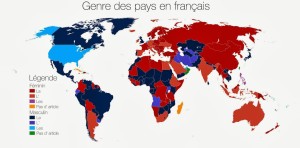What prepositions should I use when talking about different countries or cities in French?
The preposition depends on the gender of the country you’re trying to talk about. Luckily there is straightforward rule to determining the genders in French with minimal exceptions:
Almost every country ending in an “e” is a feminine country
la France (France)
la Belgique (Belgium)
l’Allemagne (Germany)
l’Algérie (Algeria)
la Chine (China)
la Guyane (Guiana)
la Russie (Russia)
la Corée (Korea)
However, there are a few exceptions to the rule above which can only be solved through memorization. Many French textbooks reiterate this point.
le Belize (Belize)
le Mexique (Mexico)
le Mozambique (Republic of Mozambique)
le Zimbabwe (Zimbabwe)
le Zaïre (Republic of Zaire)
le Cambodge (Cambodia)
Simple Example Sentences:
I come from the United States.
Je viens des États-Unis.
We are in France.
Nous sommes en France.
You’re going to China tomorrow.
Vous allez en Chine demain.
She’s from Brazil.
Elle vient du Brésil.
What Preposition do I use with different French Locations?
When you want to use a location with the prepositions to or in, then follow the rules listed below.
1) When referring to a city mainly use à
J’irai à Marseilles. I will go to Marseilles.
In a few colloquial instances you can use the preposition sur when talking about a city in a larger context or when using the city as a point of reference while remaining uncertain about exactly where you’ll be around the city. I clairified this point with my French Linguistics professor.
Je vais monter sur New York pendant des vacances. I’m going up to New York for the holidays.
On va déménager sur Paris. We’re going to move to the vicinity of Paris.
2) When referring to a city with an article use à + article
Nous sommes à la Nouvelle Orleans. We are in New Orleans.
3) When referring to a feminine country use en
J’aime les gens en France. I love people in France.
4) When referring to a masculine country which starts with a vowel, use en
Il est en Iran. He’s in Iran.
5) When referring to a masculine country which starts with a consonant, use au
On mange des tacos au Mexique. We eat tacos in Mexico :)
6) When referring to a country that is plural, use aux
Aux États-Unis, il y a beaucoup de problèmes. In the United States, there are many problems.
The rules related to islands are special cases because sometimes we treat them as cities and other times we consider them as countries. Islands referred to as cities (like Cuba or Tahiti) take the preposition à and do not contain an article within their original name. If you’re ever uncertain about an island’s gender then be proactive now and research it online.
Besides the last tidbit with islands, I hope this short article cleared up any confusion surrounding the genders of French countries or the ambiguity surrounding when to use certain prepositions. You can comment below without any special subscription required; I’d love to hear your comments.




This was helpful. Thanks a lot!
You should also talk about masculine countries. Any country that ends in any vowel other than silent “e” or consonant is masculine. Le liberia, le Mali, le Togo, le Vanuatu, le Niger, le Japon, etc.
awesome. I love it.
I found this helpful , it was well explained. Thank you.
this was helpfull thanks a lot
Thanks a lot it’s really helpful
so helpful love it
this was sooooooo helpful
I love your site, thank you so much! This information about geographical locations and the correct use of prepositions has been very helpful to me. I have one little question. Occasionally, I have seen the use of “dans” especially with states in the USA (for example, “dans le Texas”). Is this ever correct? Thanks again.
In French you spell Brazil the same as in English. Should it not be Brésil?
Hé, il est pas mal votre site web!
Bon, pour être franc, je suis français, alors parmi les choses que vous publiez, beaucoup de choses me semblent évidentes. Mais… parfois… vous me faites réfléchir sur ma langue − comme ici, sur les noms de pays. Je serais bien en peine d’expliquer ça mieux.
Petit ajout idiomatique: beaucoup de gens disent « je vais SUR Paris ». Ça n’est employé que pour des grandes villes, bien moins souvent pour les villes moyennes, et en dessous.
Merci pour votre commentaire ! Je vais ajouter cette information au article. Même si un interlocuteur natif (comme vous) ne trouve pas ces articles trop intéressants, vous pouvez pratiquer votre anglais ici ;)
Merci…actually it really helped alot
En effet, je n’ai entendu personne dire “je vais sur Montcuq” (Désole je devais la faire :D)